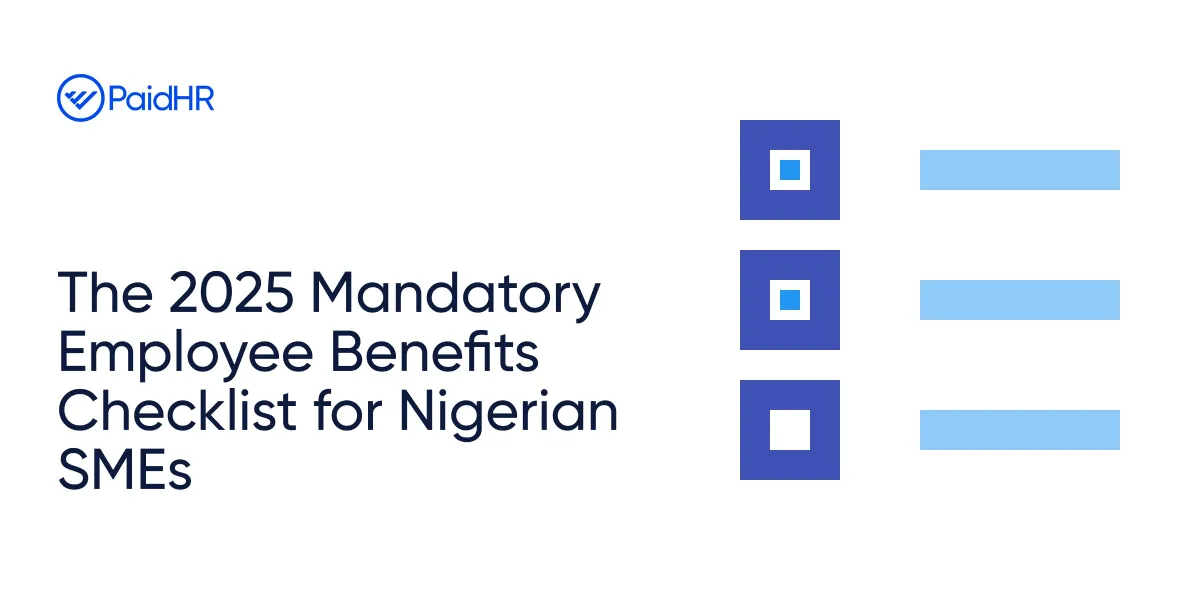Running a small business in Nigeria today feels like a daily act of resilience. You’re fighting to keep your prices stable, your generator fueled, your clients happy, and your employees from walking out the door. It’s easy to think “benefits” are for the big players: the banks, oil firms, and multinationals with endless HR budgets. However, the truth is that for Nigerian small businesses in 2026, small business employee benefits have become a vital survival strategy.
The high inflation rate is squeezing profits and exhausting people. Staff now spend hours in traffic, hundreds on fuel, and thousands on food and data every week just to keep showing up. When people are stretched that thin, the question becomes, “What can we afford to care about?”
This post is about building empathy into your payroll: the practical and affordable ways to show your team that you see their struggles and are willing to meet them halfway.
Step 1: The Non-Negotiables (What You Owe by Law)
Let’s start with the basics. Even the leanest business has a few responsibilities it can’t skip.
You probably already know the statutory stuff:
- Pension contributions (10% employer, 8% employee)
- NSITF contributions (1% of payroll for workplace safety and compensation)
- Annual leave and public holidays
- Basic health insurance under the NHIA
Yes, these are important, but for most employees, these benefits don’t touch the pain points that shape daily life. They’re invisible until something goes wrong. What comes next is where your business can stand out.
Step 2: 8 Human Benefits (What Your People Actually Need)
In a year where ₦10,000 barely lasts a weekend, meaningful small business employee benefits are the ones that help people breathe, the kind that address everyday struggles.
1. Transport Support: Hire Smart, Not Just Generous
Transport costs have doubled since subsidy removal, and lateness is often about affordability, not commitment. But most SMEs can’t afford full transport allowances, and that’s okay.
Practical ways to handle it:
- During hiring, factor in where employees live. A shorter commute saves everyone stress and helps reduce lateness. For essential in-office roles, you can include a modest transport stipend (₦10,000–₦15,000) as part of the salary package.
- If allowances aren’t possible, use Earned Wage Access (EWA), a benefit that lets employees access part of their earned pay before payday. It costs you nothing extra and helps them handle daily expenses like fuel and transport. This way, you can help your people show up without hurting your cash flow.
2. Data and Power Stipends: Balance Flexibility with Fairness
For hybrid or remote employees, data and power costs can be a real burden. But instead of covering everyone’s bills, you can create flexible options that keep productivity up without burning out your budget.
What works:
- Offer a ₦5,000 monthly stipend only for roles that truly need remote work (like sales or customer service).
- If you run a physical office, make your workspace reliable enough that staff prefer coming in, that alone saves them the cost of powering their homes.
This can be a low-cost way to boost productivity.
3. Food Support
With food prices changing every other week, feeding your team daily may feel impossible. But hunger affects focus, and small interventions go a long way.
Budget-friendly approaches:
- Partner with a nearby canteen to provide discounted meal options; you can co-subsidise part of the cost.
- Instead of daily meals, pick one day a week, say, Fridays, for lunch support or vouchers.
This can be a great way to keep employees motivated and to always have something to look forward to.
4. Flexibility: The Free Benefit Everyone Wants
Flexibility is still the most underrated benefit for small businesses. It costs nothing but solves a lot of lateness, burnout, and disengagement.
Start simple:
“Come in by 10 AM if you’re commuting from far.”
“Work from home on Fridays.”
“If you’ve met your weekly targets, close early.”
These policies show trust and respect, and in return, employees often become more committed to your business goals.
5. Rest and Mental Health Days
Everyone’s tired, but you don’t have to shut down operations to show care. Here’s how to make it sustainable:
- Align one “wellness day” per quarter with slow business periods or public holidays.
- Automate leave or sick day requests through a payroll service provider so employees can schedule time off without back-and-forth approvals.
This way, you’re preventing burnout before it becomes turnover.
6. Recognition That Costs Almost Nothing
When people feel unseen, they start looking elsewhere.
A simple “thank you,” ₦2,000 airtime bonus, or WhatsApp shoutout for a job well done goes further than you’d think.
You can even gamify it by offering a “leave early Friday” pass or “Employee of the Month” feature on your group chat.
People stay where they feel valued.
7. Growth Access: Free Learning is Still Learning
Your best employees want to grow but training doesn’t have to mean big spending.
How to make it work:
- Encourage staff to take advantage of free resources from Google Career Certificates, YouTube Learning, or Coursera.
- Host informal “lunch and learn” sessions where team members share what they know.
- Partner with another small business for skill-exchange sessions or mentorship swaps.
When people grow, your business grows too, even without paid programs.
8. End-of-Year Package
An effective End-Of-Year offering acts as a critical pillar for employee loyalty and retention. When economic pressures are high, an EOY package that directly supports an employee’s household is a strategic move with immense returns. It goes on to boost morale and secure loyalty.
You don’t need a corporate party budget to make a difference. The smartest EOY packages are built around support and care, often featuring generous festive hampers. Think essentials: rice, cooking oil, and proteins. When you help an employee feed their family during the holidays, you’re being a lifeline for their family celebrations.
The ultimate ROI? Adding a little extra paid time off. When your people feel appreciated, they get the space they need to recharge and manage the demands of the festive season. They come back to work refreshed, committed, and ready to move the company forward.
NB: If your business can’t afford to add major perks right now, financial tools like Earned Wage Access (EWA) or the Loan Marketplace by PaidHR can bridge that gap. They ease employee stress, promote retention, and give your team dignity, all without affecting your cash flow.
Step 3: Building a Lean Benefits Package That Works
You don’t need to spend millions to look like you care. Here’s how to structure your benefits around real-world budgets:
| Tier | Mindset | Monthly budget (per employee) | Core focus | Suggested benefits |
| Starter pack | “We’re running lean, but we want to show care.” | ₦10,000 – ₦20,000 | Ease daily stress | -Data/ transport support
– Recognition (public shoutouts, airtime rewards) – Access to free online learning resources |
| Growth pack | “We’re growing and want to retain committed people.” | ₦25,000 – ₦35,000 | Stability and belonging | Transport allowance + data subsidy
– Meal vouchers – Structured internal learning sessions |
| Retention pack | “We’re scaling and want loyalty, culture, and long-term growth.” | ₦40,000 – ₦100,000+ | Long-term retention | Profit-sharing or performance bonuses
– Paid learning budget (courses, certifications) – Gym access – Data allowance -Transport allowance -Shopping Vouchers |
Even if your benefits are small, make them predictable, something your employees can count on month after month.
Step 4: Negotiate Smart, Not Expensive
SMEs can leverage numbers without size.
- Collaborating with other SMEs to get affordable HMO or insurance plans is one of the smartest ways to scale employee benefits for small businesses without breaking the bank.
- Ask for simplified HMO plans: The good thing is that these health insurance companies have different plans you can choose from, and some cost 3,500 per month. It will be great to curb emergencies.
- Review yearly: Adjust benefits as your business grows.
The goal isn’t to mimic big companies. It is important to build a benefits system that feels big-hearted, even on a small budget.
The Real Meaning of “Mandatory” in Small Business Employee Benefits
Yes, the law mandates pensions, taxes, and payroll, but in a country where people are fighting just to live decently, maybe care itself should be mandatory.
The future of Nigeria’s workforce will depend on how seriously small business employee benefits are designed to reflect empathy, not excess. In this economy, money isn’t the only motivator; empathy is currency too.






